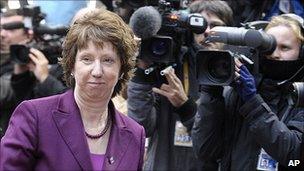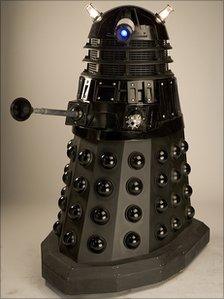Profile: EU foreign minister Baroness Ashton
- Published

Baroness Ashton needs all her diplomatic skills to give the 27-nation EU a coherent global voice
Baroness Cathy Ashton's role as lead negotiator with Iran in highly sensitive nuclear talks demonstrates the scale of the EU's new foreign policy ambitions.
Baroness Ashton is representing the UN Security Council plus Germany in two days of talks in Geneva with Iran's chief nuclear negotiator Saeed Jalili. She was mandated for the role by China and Russia, as well as the Western powers.
Iran is already under UN sanctions amid suspicions that Tehran is developing a nuclear weapons capability.
Just over a year ago Baroness Ashton - little known in the UK, let alone abroad - was chosen for the new post of EU High Representative for Foreign Affairs.
As Europe's first "foreign minister" she is representing the EU's 500 million citizens in dealings with the rest of the world.
The job was created under the Lisbon Treaty, with the goal of making the EU speak "with one voice" internationally.
Working behind-the-scenes
Baroness Ashton has made "quiet diplomacy" her motto - and the official launch of her European External Action Service (EEAS) on 1 December certainly was quiet.
She gave a closed-door briefing in Brussels for the 136 heads of EU delegations worldwide, to set out her priorities. There was no fanfare - not even a speech on the EEAS website to mark the occasion.
"We didn't want to launch with a big show," her spokeswoman Maja Kocijancic told the BBC.
"In these austerity times that's not necessary - the service is there to serve citizens, several more steps will be necessary for the service to be fully up and running, for example the formal transfer of staff on 1 January, or when we have the EU budget."
Funding of the EEAS has been set at 475.8m euros (£404m) for 2011. But it has not yet been officially confirmed as tough EU budget negotiations are still going on.
Eventually the EEAS will have a staff of about 5,400. They will take over the EU's diplomatic missions around the world.
Big reorganisation
In Brussels, the EEAS is moving into a new building, rent-free for the first two years but costing about 12m euros in rent annually thereafter.
It will mean a significant saving for the EU, as foreign policy staff are currently scattered in about eight different buildings, Ms Kocijancic said.
The EEAS is merging two EU foreign policy arms - the staff under former High Representative Javier Solana and those under the EU External Affairs Commissioner.
As a Commission vice-president Baroness Ashton receives a basic annual salary of about 265,470 euros - and various EU allowances on top of that. In contrast, the UK prime minister gets about £142,500 (167,500 euros).
Late last year she was picked for the high-profile job when then-prime minister Gordon Brown, a long-time friend and ally, persuaded other EU leaders to throw their weight behind her.
She expressed "slight surprise" at her elevation - and that surprise was shared by many observers.
Brussels compromise
She was Leader of the House of Lords before becoming EU Trade Commissioner in 2008 - only a short period to make her mark in Brussels.
But she earned a reputation as a highly competent trade commissioner, former UK Europe Minister Denis MacShane told the BBC. A landmark EU trade deal with South Korea was among her achievements in that post.
According to Mr MacShane, her meteoric rise to the coveted new post came about through a "classic Brussels fudge", in which the EU sought a consensus candidate who would not ruffle feathers in any major European capitals.
"She's tough... and doesn't schmooze the French," Mr MacShane said.
Yet she has appointed a veteran French diplomat, Pierre Vimont, as EEAS secretary-general - her right-hand man.
She has needed plenty of toughness to ride out the sniping that descended on her soon after her appointment.
France criticised her for not going to Haiti immediately after the devastating earthquake there in January.
She drew flak for failing to attend an EU defence ministers' meeting.
Then France and Sweden criticised her appointment of Portuguese diplomat Joao Vale de Almeida as EU ambassador to Washington. He is a long-standing colleague of EU Commission President Jose Manuel Barroso, who also hails from Portugal.
Hotline to Washington

Baroness Ashton has a Dalek - a sign of her passion for science fiction
Wearing her twin hats as Commission vice-president and EU High Representative Baroness Ashton has a crowded schedule.
Responding to the criticisms, she argued that she had "not yet developed the capacity for time travel".
That reference to the time-travelling science fiction hero Doctor Who is no accident - she is a fan of the popular TV series, and has a life-size Dalek in her living room.
Her practical, down-to-earth character was praised by US Secretary of State Hillary Clinton in a BBC interview. She said she was glad to be able to "blow off a little steam" with Baroness Ashton and chat about shopping, as well as the life-or-death issues of international politics.
Born in Lancashire in 1956, Baroness Ashton is married to the former journalist and respected pollster Peter Kellner, with whom she has two children and three stepchildren.
Mr Kellner, a well-connected Labour Party insider, runs the YouGov polling organisation.
They have a house in St Albans and an apartment in London.
Labour Party insider
Before her Brussels career, Baroness Ashton held a number of junior ministerial posts, steadily rising through the Labour ranks. She was made a life peer in 1999.
Starting off as junior minister in the Department of Education, she was given responsibility for Labour's flagship education project Sure Start between 2002 and 2004.
She then switched to the Ministry of Constitutional Affairs in 2004, being voted politician of the year in 2006 by gay rights group Stonewall for championing equality and human rights.
Gordon Brown quickly promoted her to become Leader of the Lords when he became prime minister in 2007. In that post she steered the EU's controversial Lisbon Treaty through the house.
Before entering Parliament, Baroness Ashton served as a vice-chairman of the Campaign for Nuclear Disarmament (CND) in 1977-1983.
Some MEPs grilled her about her time at CND, at her confirmation hearing in Strasbourg. She retorted that CND's relevance in the 1970s "is not the relevance of 2010", and that she had left the movement long ago.
With a degree in economics from the University of London, she worked first as a management consultant and then for the Business in the Community organisation, which encourages greater social responsibility by companies.
For most of the 1990s, she worked as a freelance policy adviser, also taking on the roles of chair of the Hertfordshire Health Authority and vice-president of the National Council of One-Parent Families.
- Published7 December 2010
- Published26 October 2010
- Published14 October 2010